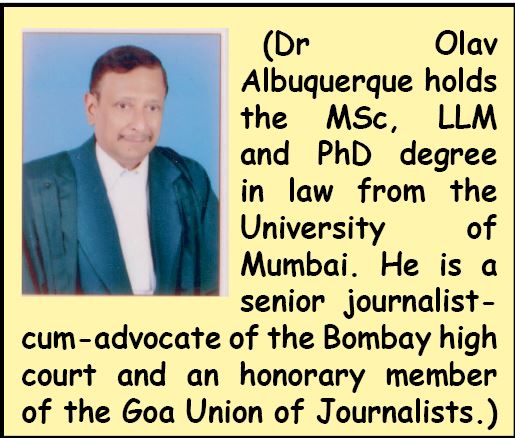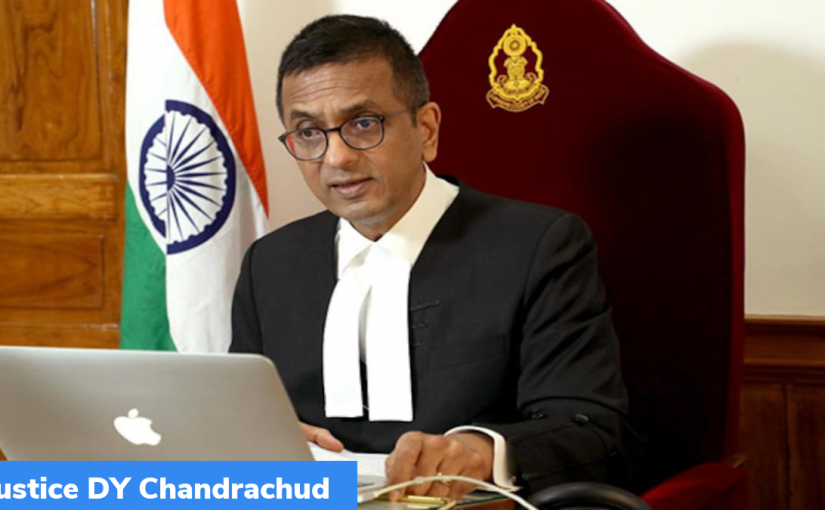By Dr Olav Albuquerque
THE tenure of the incoming Chief Justice of India (CJI) Dhananjaya Chandrachud is bound to be exciting with the next general elections due in 2024 during which time, he will still be at the helm of the judiciary. Sadly, he will not break the record created by his father, the late YV Chandrachud, who was the CJI during the Emergency and continued as CJI for over seven years.
Interestingly, the present CJI Uday Umesh Lalit deviated from the tradition of visiting the chamber of the senior most judge to hand over a copy of the recommendation letter to him. CJI Lalit handed over the letter to Jusice Chandrachud in front of the other Supreme Court judges.
It is just a formality for President Droupadi Murmu to designate Justice Chandrachud as the incumbent CJI who will take over his Constitutional duties soon after the present CJI demits office on November 8, 2022. This will be the final step for Justice Chandrachud prior to his taking the oath-of-office as the 50th CJI on Novemebr 9.
What most people do not know is that the incoming CII is the most urbane, suave, boyish-looking judge to have adorned the office of the CJI. Friendly and easily approachable, the incoming CJI is a product of the Bombay Bar where he honed his skills as a lawyer par excellence while arguing weighty matters in the Bombay high court first as a lawyer, then an additional solicitor general before being sworn in as a judge of the Bombay high court in the year 2000 and later transferred as the chief justice of the Allahabad high court in 2016.
LARGEST HIGH COURT
THE Allahabad high court is the largest high court in India and often laconically termed as afflicted with the uncle-nephew syndrome, which is why former Supreme Court Judge Markandey Katju spoke about it in disparaging terms. However, Chief Justice Chandrachud was firm and unmoving when he took firm decisions to compulsorily retire those judges from the lower courts who were not performing. His administrative and judicial decisions impressed the then Supreme Court collegium sufficiently to ensure that he was elevated as a Supreme Court judge.
Even as a Supreme Court judge, Justice Chandrachud ensured that he was unmoved by external considerations of sympathy or concern for those whom he felt were not fit to be elevated as high court judges. He along with his brother judge, AM Khanwilkar opposed the elevation of the then district and sessions judge Pushpa Ganediwala to the Bombay high court. She was a college teacher but her academic credentials did not impress both Justices Chandrachud and Khanwilkar. They recommended to the then CJI Sharad Arvind Bobde that she should not be elevated as a judge of the Bombay high court.
PUISNE JUDGE
HOWEVER, this cut no ice with the then CJI Sharad Arvind Bobde who recommended her for confirmation as a puisne judge before her notorious skin-to-skin contact resulted in the acquittal of three alleged child molesters. This culminated in the unprecedented step of CJI Sharad Arvind Bobde recalling his recommendation for her confirmation as a puisne judge. And extended her probation. When she had to face the ignominy of being reverted as a sessions court judge, she chose to resign.
This is what Justice Chandrachud is made of! A youthful-looking judge with a progressive outlook who even refused to take action against a person who was recording the proceedings of the Supreme Court within the court room. The judge said, “Court proceedings are open to all and sundry. I noticed him recording the court proceedings but then thought why should I take action against him when what we say is open for all to hear and observe?”
In sum, the incoming CJI will have a distinguished career as a CJI during which he will have to take sensitive decisions in hyper-sensitive cases where the government may be rubbed the wrong way. How he handles the government and his colleagues will be watched by all and sundry.

